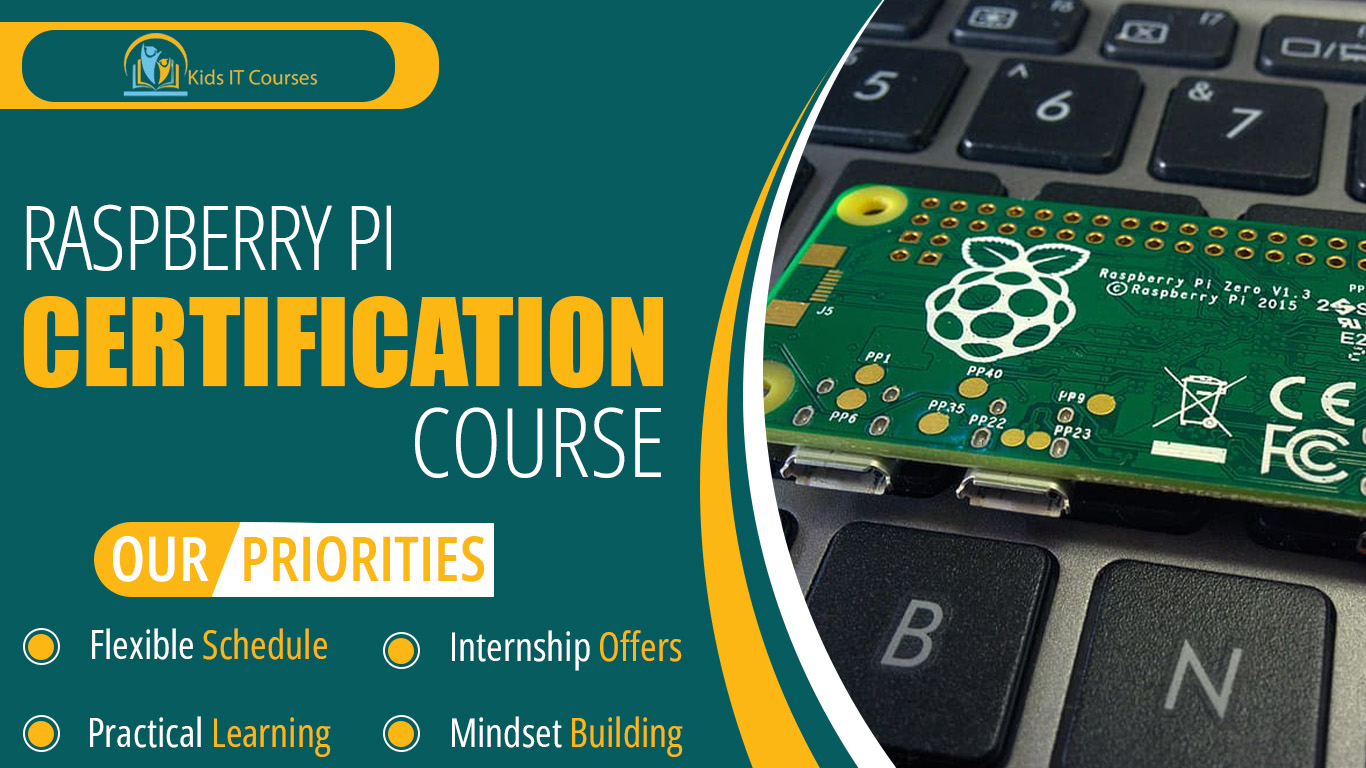
Raspberry Pi Course for Kids
Definition
• Raspberry Pi is a small computer for kids. They learn how computers work in a fun way.
• It helps kids solve problems step by step. This improves their brain skills.
• Kids connect wires, sensors, and lights. They learn electronics in a safe way.
• They write code and see real results. It makes coding feel like magic.
• Kids can build games, robots, or alarms. Learning becomes exciting and creative.
• Millions use Raspberry Pi in schools and labs. Kids feel like part of something big.
• It’s a great first step into tech. Kids start making cool things from a young age.
Raspberry Pi | Beginner Online Courses Nearby Rawalpindi
Importance
• Kids learn to use a tiny computer called Raspberry Pi. It’s small, fun, and full of power!
• They solve problems and build smart ideas. It helps grow creative and logical minds.
• Kids can make lights blink, games run, or robots move. It’s a hands-on way to learn tech.
• They write simple code to control the Pi. It makes coding feel like magic.
• Kids learn how smart devices work in real life. It connects learning to the world around them.
• Many projects can be done with friends or classmates. It teaches sharing and working together.
• This course builds a strong tech base from a young age. It’s perfect for future inventors!
Advantages for Freelancing
• Kids learn how computers work. It boosts thinking and problem-solving.
• They build mini computers and gadgets. It feels like magic but it’s real learning!
• Kids can make games, robots, or lights blink. Projects make learning exciting and fun.
• They create their own smart inventions. It builds confidence and imagination.
• Raspberry Pi helps kids learn Python and Scratch. They code while playing and exploring.
• Kids learn wires, sensors, and circuits. They feel like mini engineers.
• Raspberry Pi is used worldwide in schools. Kids feel part of a big tech family.
Session 1 : What is Raspberry Pi?
Introduction to Raspberry Pi as a small, affordable computer
Real-life example: Building a weather station or home automation system
Overview of different Raspberry Pi models and accessories
Setting up Raspberry Pi with Raspberry Pi OS (formerly Raspbian)
Activity: Set up your Raspberry Pi and explore the desktop interface
Session 2 : Connecting Raspberry Pi to Peripherals
Connecting your Raspberry Pi to a monitor, keyboard, and mouse
Real-life example: Setting up a Raspberry Pi to control lights or sensors
Using GPIO (General Purpose Input/Output) pins for physical computing
Activity: Connect an LED to your Raspberry Pi and control it
Session 3 : Using Raspberry Pi with Python
Introduction to programming with Python on Raspberry Pi
Writing Python scripts to interact with hardware
Real-life example: Blinking an LED, controlling motors, or reading sensors
Activity: Write a Python script to make an LED blink
Session 4 : Networking & Remote Access
Connecting your Raspberry Pi to the internet (Wi-Fi/Ethernet)
Accessing your Raspberry Pi remotely using SSH
Real-life example: Remotely controlling your Pi or managing projects
Activity: Set up SSH and control your Raspberry Pi from another device
Session 5 : Raspberry Pi as a Media Center
Installing Kodi or Plex for media streaming
Turning your Raspberry Pi into a media server or player
Real-life example: Streaming movies, music, or TV shows on your TV
Activity: Set up a media center and stream content to your devices
Session 6 : Raspberry Pi and Internet of Things (IoT)
Understanding IoT and how Raspberry Pi is used in IoT projects
Connecting sensors, cameras, and devices to Raspberry Pi for IoT
Real-life example: Building a home automation system with Raspberry Pi
Activity: Create an IoT project that controls home devices from the internet
Session 7 : Setting Up Web Servers and Projects
Installing a web server (Apache, Nginx) on Raspberry Pi
Creating a local website or web app hosted on the Pi
Real-life example: Running a personal website or blog with Raspberry Pi
Activity: Host a basic website on your Raspberry Pi and access it remotely
Session 8 : Raspberry Pi Projects for Fun and Learning
Fun project ideas: Build a robot, create a smart mirror, or make a game console
Real-life example: Turning Raspberry Pi into a retro gaming console (RetroPie)
Integrating different components like sensors, motors, and displays
Activity: Choose a fun Raspberry Pi project to complete (e.g., a mini arcade or weather station)
Bonus Materials
Raspberry Pi GPIO pinout guide and troubleshooting tips
Mini projects: Home automation, smart mirror, temperature sensor
Access to free Raspberry Pi resources and communities
Certificate of Completion for Raspberry Pi Projects
